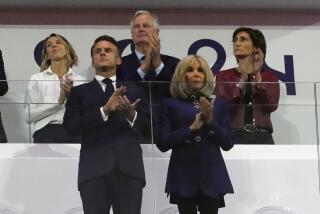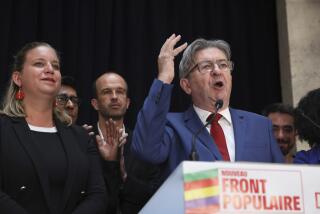Canadian Voters Split on Parties, Ensuring a Minority Government
OTTAWA â The Liberal Party of Prime Minister Paul Martin staged a last-minute comeback Monday to win the most seats in Canadaâs national elections -- but not a popular mandate.
Weary of the long-ruling Liberals and wary of the Conservative challengers, Canadaâs voters denied both a victory Monday, leading to the countryâs first minority government in 25 years. The Liberals won 136 seats of 308 in Parliamentâs House of Commons, to the Conservativesâ 93, with smaller parties getting the rest. Pre-vote polls had shown the Conservatives and Liberals virtually in a dead heat.
âWe fought the tightest campaign in many years,â Martin said in a post-midnight speech. âAn election is a time to pass judgment, and the message in this regard was unmistakable: Canadians expected and expect more from us, and as a party and as a government we must do better. And we will, I pledge to you tonight.â
Martin will be scrambling in the next few days to negotiate alliances with two smaller parties -- separatist Bloc Quebecois and the New Democratic Party -- to win enough support in Parliament to pass laws.
âWhat counts is not how many seats your party has. What counts is how much of Parliament supports you,â said Nelson Wiseman, a political scientist at the University of Toronto.
The tightest race in decades reflected voter disenchantment with the Liberalsâ slow-acting leadership and recent revelations of a financial scandal. Martin won a reprieve Monday but will now have to prove that he deserved it.
âItâs been a tough six months,â said John Duffy, a political strategist who has advised Martin. âThere was serious frustration with the Liberal Party after 10 years and with the sponsorship scandal. Thatâs unmistakable. But itâs also clear that Canada is not ready to embark on a conservative course.â
Despite Martinâs surprise showing, big challenges lie ahead. A minority government is inevitably an unstable government, political scientist Steven Clarkson said.
âIf a small party decides it doesnât like something, it can simply vote against it,â he said. âThere will be tremendous maneuvering to stay in power by all the parties.â
Having to bow to other partiesâ wishes to win their support in the government may redefine the Liberalsâ agenda.
The Conservativesâ platform mirrors the Bush administrationâs more closely than does the Liberalsâ. Conservative leader Stephen Harper apologized on behalf of Canada for not supporting the U.S. during the Iraq invasion. He favors closer economic integration with the U.S., pledges to cut taxes and wants to participate in a costly American missile defense system. Conservative Party members have said they would reexamine rights for gay weddings and abortion and would abandon the Kyoto accord on reducing âgreenhouse gases.â
Martin is determined to quietly move closer to Washington after a decade of distance under former Prime Minister Jean Chretien, but he also wants to maintain an independent identity for Canada. He has promised to increase spending by nearly $21 billion to improve Canadaâs universal healthcare system and provide national day care.
In some ways, the biggest winner Monday was the Bloc Quebecois, whose 55 House of Commons seats represent a record for the party. Disgruntled voters used it as a protest vehicle, putting separatists in the ironic position of becoming the cornerstone of the federal government.
The New Democratic Party got 23 seats, and one seat went to another party with little support.
Parliament also has a Senate, which is appointed.
The separatist Bloc Quebecois and the New Democratic Party favor more progressive social policies and less integration with the United States. The Bloc, like the Conservatives, thinks the government should leave decisions to the provinces, but it will be willing to ally with the Liberals in order to stay in power, analysts say.
The neck-and-neck race has been a nasty surprise for the Liberal Party. When Martin inherited the prime ministerâs post from Chretien, who stepped down in November after three terms, he was hailed as an innovative leader who could revive the fatigued party. As finance minister under Chretien for nine years, Martin had reversed the countryâs deep deficit and restructured the healthcare system.
But during his tenure, the Liberals also diverted about $74 million to party-connected advertising agencies for little or no work during a campaign to counter separatist sentiments in Quebec. Despite his denials of involvement, Martin watched his popular support collapse when a government auditorâs investigation was unveiled in February.
Unfulfilled promises of shorter waits for healthcare and improved child-care services, combined with higher taxes and health premiums, also fueled voter frustration.
Martin tried to regain the publicâs trust during the five-week campaign, finishing it off Sunday with a one-day cross-country tour that showed him dipping his bare toes into each ocean. But many Liberal voters expressed their simmering anger by shifting to other parties.
âPeople are mad, really mad,â retiree June Blackburn said after she voted -- not for the Liberals -- at a church in Ottawa Center, within sight of the capitalâs Parliament Hall. âI would have voted for them before, but I canât now. Martin was finance minister during the scandal. He had to have known what was going on.â
Blackburn said she was concerned about what she called the Conservativesâ âanti-rightsâ platform. But she said she was convinced that a minority government would help keep the more extreme moves in check -- and was likely to be short-lived.
Canada has not had a minority government since 1979. Conservative Joe Clarkâs government dissolved within a year.
More to Read
Sign up for Essential California
The most important California stories and recommendations in your inbox every morning.
You may occasionally receive promotional content from the Los Angeles Times.










